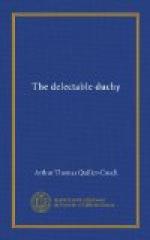“They was married three months, an’ ‘twas harvest time come round, an’ I in his vield a-gleanin’. For I was suffered near to that extent, seem’ that the cottage here had been my fathers’, an’ was mine, an’ out o’t they culdn’ turn me. One o’ the hands, as they was pitchin’, passes me an empty keg, an’ says, ‘Run you to the farm-place an’ get it filled.’ So with it I went to th’ kitchen, and while I waited outside I sees his coat an’ wesket ‘pon a peg i’ the passage. Well I knew the coat; an’ a madness takin’ me for all my loss, I unhitched it an’ flung it behind the door, an’, the keg bein’ filled, picked it up agen and ran down home-along.
“No thought had I but to win Seth back. ’Twas the charm you spoke about: an’ that same midnight I delved a hole by the dreshold an’ buried the coat, whisperin’, ‘Man, come back, come back to me!’ as Aun’ Lesnewth had a-taught me, times afore.
“But she, the pale woman, had a-seen me, dro’ a chink o’ the parlour-door, as I tuk the coat down. An’ she knowed what I tuk it for. I’ve a-read it, times and again, in her wifely eyes; an’ to-day you yoursel’ are witness that she knowed. If Seth knowed—”
She clenched and unclenched her fist, and went on rapidly.
“Early next mornin’, and a’most afore I was dressed, two constables came in by the gate, an’ she behind ’em treadin’ delicately, an’ he at her back, wi’ his chin dropped. They charged me wi’ stealin’ that coat—wi’ stealin’ it—that coat that I’d a-darned an’ patched years afore ever she cuddled against its sleeve!”
“What happened?” I asked, as her voice sank and halted.
“What happened? She looked me i’ the eyes scornfully; an’ her own were full o’ knowledge. An’ wi’ her eyes she coaxed and dared me to abase mysel’ an’ speak the truth an’ win off jail. An’ I, that had stole nowt, looked back at her an’ said, ’It’s true. I stole the coat. Now cart me off to jail; but handle me gently for the sake o’ my child unborn.’ When I spoke these last two words an’ saw her face draw up wi’ the bitterness o’ their taste, I held out my wrists and clapped the handcuffs together like cymbals and laughed wi’ a glad heart.”
She caught my hand suddenly, and drawing me to the porch, pointed high above Sheba, to the yellow upland where the harvesters moved.
“Do ’ee see ’en there?—that tall young man by the hedge—there where the slope dips? That’s my son, Seth’s son, the straightest man among all. Neither spot has he, nor wart, nor blemish ’pon his body; and when she pays ’en his wages, Saturday evenin’s, he says ’Thank ’ee, ma’am,’ wi’ a voice that’s the very daps o’ his father’s. An’ she’s childless. Ah, childless woman! Childless woman! Go back an’ carry word to her o’ the prayer I’ve spoken upon her childlessness.”
And “Childless woman!” “Childless woman!” she called twice again, shaking her fist at the windows of Sheba Farm-house, that blazed back angrily against the westering sun.




